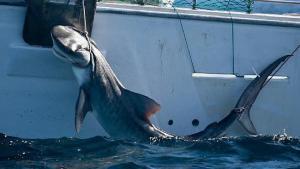 A major media release today coordinated by Jessica Meeuwig in Western Australia makes the (obvious) point that there’s no biological justification to cull sharks.
A major media release today coordinated by Jessica Meeuwig in Western Australia makes the (obvious) point that there’s no biological justification to cull sharks.
–
301 Australian and International Scientists experts have today provided their submission to the Western Australia Environmental Protection Authority (EPA), rejecting the scientific grounds for the proposed three-year drum-line programme.
Coordinating scientist, Professor Jessica Meeuwig from the University of Western Australia said:
“To have over 300 researchers, including some of the world’s top shark specialists and marine ecologists, all strongly agreeing that there is no scientific basis for the lethal drum-line programme, tells you how unjustified the government’s proposal is. If the EPA and the Federal Minister for the Environment are using science for decisions, the drum-line proposal should not be approved.”
The experts agree that the proposal presents no evidence that the lethal drum-line programme, as implemented, will improve ocean safety. It ignores evidence from other hook-based programs in Hawaii and Queensland that have been shown to be ineffective in reducing shark attacks on humans.
Dr. Christopher Neff from the University of Sydney stated:
“There is no evidence that drum lines reduce shark bites. The Western Australia EPA now faces a question of science versus politics with global implications because it is considering establishing a new international norm that would allow for the killing of protected white sharks.”
The drum lines are ineffective and indiscriminate, with 78% of the sharks captured not considered ‘threatening’ to humans. Yet, scientifically supported, non-lethal alternatives such as the South African ‘Shark Spotter’ and Brazil’s ‘Tag and Remove’ programmes are not adequately assessed as viable options for Western Australia.

© PerthNow.com.au
Dr. Fred Whoriskey from Dalhousie University (Canada) and Executive Director of the global Ocean Tracking Network (OTN) that includes over 400 scientists from 15 countries, said:
“The OTN has protested the cull because it makes the oceans less safe. The cull undermines white shark research programs that provide the fundamental understanding of the behaviour of these animals that is key to guiding ocean-safety strategies.”
The experts are also concerned that potential impacts on protected and threatened species are poorly evaluated, and ignore uncertainty, population biology, and the best available, peer-reviewed estimates of population size. Instead, the government is relying on its own internal estimates.
University of Queensland Principal Research Fellow Jennifer Ovenden challenged the science of the Western Australian Government submission. The government accepted the results of her two-year, peer-reviewed study identifying separate white shark populations on the east and west coasts, but ignored the estimated numbers of animals in her study. She stated,
“I think it’s unprofessional because they are making inferences from inappropriate data sources using computer models. I think it would have been prudent to include our mature individual estimates in at least one computer model.”
Professor Corey Bradshaw, world-renowned ecologist from the University of Adelaide, added:
“Killing sharks indiscriminately will never reduce shark attacks on humans until we kill ever last one of them. Committing comprehensive sharkocide like that would only destroy the ocean ecosystem supporting recreational diving, fishing, oxygen production and climate regulation. The Western Australia Government’s policy is nothing but a political circus and will only do long-term damage.”
Negative impacts on the wider marine ecosystem and World Heritage Areas are dismissed with little justification, ignoring existing scientific knowledge on the role that sharks play in maintaining ecosystem health.
Professor Mike Heithaus from Florida International University said
“More than 15 years of research on the ecological importance of tiger sharks in Western Australian waters has shown that these animals – especially the large individuals targeted by the cull – play a critical role in the major seagrass ecosystems that provide immense benefits to people in Western Australia. The loss of tiger sharks could destabilize the system and negatively impact ocean health and economic benefits. We also know that tiger sharks range up and down the Western Australian coast, so effects of a culling program could be widespread.”
Professor Bob Costanza, an internationally respected ecological economist from the Australian National University said:
“Marine ecosystems provide a range of valuable services to humanity. Removing apex predators from these systems can have unintended ecological and economic costs that far outweigh any real or perceived benefits.”
Noting the important role that Australia plays in global leadership for the oceans, Dr. Elliott Norse, Founder and Chief Scientist of the Marine Conservation Institute (USA) asked:
“How can a country be a leader when it comes to saving whales in Antarctica, but kill threatened sharks in Western Australia? It is a step backwards at a time when a growing list of countries is moving to protect larger areas of our oceans, in part to protect these mobile large predators, as has recently occurred in the US with President Obama’s announcement of a greatly expanded Pacific Remote Islands Marine National Monument.”
Professor Meeuwig concluded that:
“This statement highlights that, given the lack of demonstrated safety benefits of drum lines, the uncertainties around the impacts of a cull on threatened and ecologically important marine wildlife and the ecosystems they inhabit, and given the availability of immediately applicable, proven, non-lethal alternatives, we don’t need to resort to a 1960s-style lethal response to achieve safety outcomes.”
The scientific consensus from 301 world experts categorically condemns the ineffective and dangerous policy of killing sharks in Western Australia.

